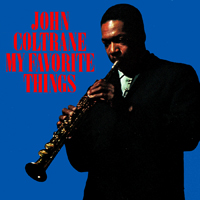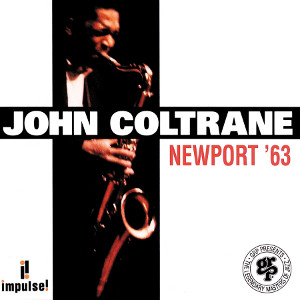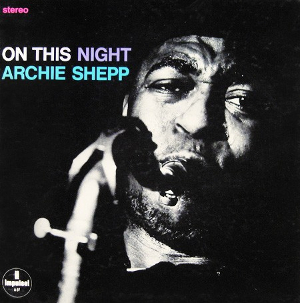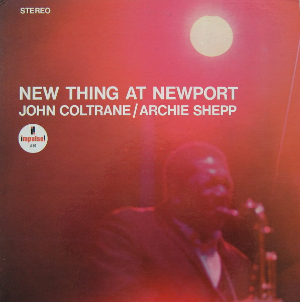
John William Coltrane was an American jazz saxophonist and composer. Working in the bebop and hard bop idioms early in his career, Coltrane helped pioneer the use of modes and was one of the players at the forefront of free jazz. He led at least fifty recording sessions and appeared on many albums by other musicians, including trumpeter Miles Davis and pianist Thelonious Monk. Over the course of his career, Coltrane's music took on an increasingly spiritual dimension, as exemplified on his most acclaimed albums A Love Supreme (1965) and Ascension (1966). He remains the most influential saxophonist in music history and has received numerous posthumous awards, including a Pulitzer Prize in 2007, and was canonized by the African Orthodox Church. His second wife was pianist and harpist Alice Coltrane. The couple had three children: John Jr. (1964–1982), a bassist; Ravi, a saxophonist; and Oran, also a saxophonist.

Archie Shepp is an American jazz saxophonist, educator and playwright who since the 1960s has played a central part in the development of avant-garde jazz.

James Emory Garrison was an American jazz double bassist. He is best remembered for his association with John Coltrane from 1961 to 1967.

My Favorite Things is the seventh studio album by jazz musician John Coltrane, released in March 1961 on Atlantic Records. It was the first album to feature Coltrane playing soprano saxophone. An edited version of the title track became a hit single that gained popularity in 1961 on radio. The record became a major commercial success.

Sun Ship is a posthumously released jazz album by tenor saxophonist John Coltrane recorded on August 26, 1965. Along with First Meditations, recorded a week later, it was one of the last recording dates for Coltrane's "Classic Quartet" with McCoy Tyner, Jimmy Garrison, and Elvin Jones. The recording occurred shortly after a thirty-seven minute long performance by the quartet, with Archie Shepp added as a second tenor player, at Soldier Field in Chicago which was described by Ben Ratliff as "a famous breaking point — a Dylan-at-Newport, or a Rite of Spring," with music that he described as "jagged and vociferous... It aggravated a great part of the crowd, prompting, according to some witnesses, a large exodus."

Ascension is a jazz album by John Coltrane recorded in June 1965 and released in 1966. It is considered a watershed in Coltrane's work, with the albums recorded before it being more conventional in structure and the albums recorded after it being looser, free jazz inspired works. In addition, it signaled Coltrane's interest in moving away from the quartet format. AllMusic called it "the single recording that placed John Coltrane firmly into the avant-garde".
The Major Works of John Coltrane is a compilation album by jazz musician John Coltrane, released in 1992 by GRP Records. It features extended compositions, all recorded in 1965 with expanded ensembles, and originally released by Impulse! Records on Ascension, Om, Kulu Sé Mama, and Selflessness: Featuring My Favorite Things. Both editions of Ascension are included.

Newport '63 is a live album by jazz musician John Coltrane recorded at the 1963 Newport Jazz Festival, with one additional track recorded at the Village Vanguard in 1961.

The John Coltrane Quartet Plays is an album by jazz musician John Coltrane, recorded in February and May 1965, shortly after the release of A Love Supreme.

Live at the Half Note: One Down, One Up is a 2005 double CD compilation of two previously unreleased 1965 Friday radio broadcasts – March 26 and May 7 – at the Half Note Club in New York City, featuring John Coltrane with McCoy Tyner, Jimmy Garrison, and Elvin Jones.

Live in Antibes is a live album by jazz musician John Coltrane that was released in 1988 on the France's Concert label.

To the Beat of a Different Drum is a double album by jazz musician John Coltrane released posthumously in 1978. It is a compilation of recordings in which Roy Haynes replaced Coltrane's regular drummer Elvin Jones.

Selflessness Featuring My Favorite Things is a posthumous album by jazz musician John Coltrane, released in 1969. The album juxtaposes two tracks recorded live at the 1963 Newport Jazz Festival with a single track ("Selflessness") recorded in a studio in Los Angeles in 1965.

Four for Trane is a studio album by Archie Shepp released on Impulse! Records in 1964. Four of the five tracks are reworkings of pieces originally recorded on John Coltrane's 1960 Giant Steps and Coltrane Plays the Blues, rearranged by Shepp and Roswell Rudd. Coltrane himself co-produced the album alongside Bob Thiele. The album was Shepp's first release for Impulse!, and would be followed by more than a dozen additional releases on the label.

On This Night is an album by Archie Shepp released on Impulse! Records in 1965. The album contains tracks recorded by Shepp, David Izenzon and J. C. Moses in March 1965 and with a larger band in August of that year.

The Mastery of John Coltrane, Vol. I: Feelin' Good is a compilation album by American saxophonist John Coltrane, the first of a series of four compilations released on Impulse! between 1978 and 1979, all sharing the same cover artwork designed by Stuart Kusher, Richard Germinaro and Vigon Nahas Vigon. It features pieces recorded in 1965, seven in studio and one live. All the tracks were previously unissued in these mixes at the time of release. At present, the availability of said tracks is as follows:

The New Wave in Jazz is a live album recorded on March 28, 1965 at the Village Gate in New York City. It features groups led by major avant-garde jazz artists performing at a concert for the benefit of The Black Arts Repertory Theater/School founded by Amiri Baraka, then known as LeRoi Jones. The album was released on LP in 1965 on the Impulse! label, and was reissued on CD in 1994 with a different track listing.

My Favorite Things: Coltrane at Newport is a compilation album by jazz musician John Coltrane released by Impulse! in 2007. It brings together tracks from performances by Coltrane's quartet at the Newport Jazz Festival in Newport, Rhode Island on July 7, 1963, and July 2, 1965.

Dear Old Stockholm is a compilation album by jazz musician John Coltrane released by GRP and Impulse! in 1993. The music, which was recorded on April 29, 1963 and May 26, 1965 at Van Gelder Studio in Englewood Cliffs, NJ, features Coltrane's quartet with Roy Haynes substituting for Elvin Jones on drums.

















